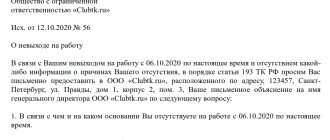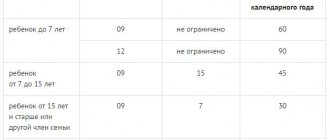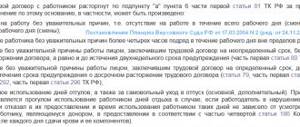Home / Labor Law / Payment and Benefits / Compensation
Back
Published: 04/25/2016
Reading time: 8 min
0
2526
Forced absenteeism always occurs due to the fault of the employer. And if the employee was unable to begin performing his job duties, then he should not bear any responsibility for this.
Moreover, the law obliges the employer to compensate the employee in monetary equivalent for the time of his forced absence .
- What is illegal truancy?
- When must an employer pay for absenteeism?
- How to calculate the time of forced absence?
- How is forced absenteeism compensated for illegal dismissal?
- Forced absenteeism in examples
The legislative framework
- Article 243 of the Labor Code of the Russian Federation obliges the employer to compensate the employee for the wages he did not receive during the illegal deprivation of the opportunity to work.
- Article 139 of the Labor Code of the Russian Federation and Decree of the Government of the Russian Federation dated December 24, 2007 No. 922 establish the procedure for calculating average earnings when calculating the amount of compensation for forced absence.
- Articles 386 and 392 of the Labor Code of the Russian Federation regulate the deadlines for filing an appeal in case of illegal dismissal to the labor dispute commission and to the court.
- Articles 208 and 217 of the Tax Code of the Russian Federation contain a list of income that is subject to and exempt from personal income tax.
- Article 420 of the Tax Code of the Russian Federation determines income subject to insurance premiums.
- Article 255 of the Tax Code of the Russian Federation establishes a list of labor costs taken into account when calculating income tax and tax paid under the simplified taxation system.
Withholding personal income tax from payments to an employee for the period of forced absence
Compensation for forced absence due to illegal dismissal
The issue of taxation of compensation payments related to the reinstatement of an employee at work is the subject of heated debate between representatives of organizations and tax authorities.
According to employer organizations, the very concept of compensation implies the absence of the need to collect and pay personal income tax in accordance with Art. 217 Tax Code of the Russian Federation. Guided by this provision of the Tax Code, many companies pay workers compensation for forced absence in a “pure” form (average earnings * number of working days), without withholding personal income tax.
The regulatory authorities, for their part, consider the withholding of personal income tax necessary in this case. The tax authorities argue their position by the fact that payments to an employee for the period of forced absence:
- payments that are exempt from personal income tax are not mentioned in the list;
- are not compensation payments in nature, since there are no documents confirming the employee’s expenses to be reimbursed;
- do not apply to payments accrued to an employee in connection with the performance of official duties.
The controllers outlined the above justifications in letter No. 03-04-05/36473 dated July 24, 2014. Thus, in general, payment in the form of compensation to an employee for a period of forced absence is subject to personal income tax at the established rate (13% for residents of the Russian Federation, 30% for non-residents).
The Ministry of Finance did not indicate the deadline for transferring personal income tax to the budget in the letter, however, guided by the current provisions of tax legislation, the employer can withhold and pay personal income tax:
- on the day compensation is accrued to the employee (on the day of reinstatement at work);
- on the day the employee receives his or her next paycheck.
If an employee received compensation and then quit, but the employer did not withhold personal income tax and did not transfer it to the budget, then repayment of tax obligations in this case is the responsibility of the employee.
For cautious employers who seek to minimize the risk of conflicts and claims from controllers, we recommend withholding personal income tax and transferring the tax to the budget directly on the day the compensation is paid.
Forced absenteeism under the Labor Code of the Russian Federation
The provisions of the Labor Code do not directly define the term “forced absenteeism.” At the same time, modern judicial practice and decisions of the State Labor Inspectorate (SLI) define forced absenteeism as the absence of an employee from work due to circumstances beyond his control. In other words, absenteeism is considered forced provided that the employee was absent from work due to the fault of the employer or third parties.
Common examples of forced absenteeism are the absence of an employee from the workplace for the following reasons:
- illegal dismissal;
- preventing an employee from performing official duties without explanation;
- illegal actions of third parties, as a result of which the citizen was unable to arrive at the workplace and perform official duties.
In what cases does forced absenteeism occur?
Absenteeism may be considered forced in the following circumstances:
- The employer is trying to force an employee to leave the organization by not allowing him to enter the workplace. This fact needs to be confirmed. Witness statements, photos and videos are used as evidence.
- Transferring an employee to a position with less pay without sufficient grounds.
- Refusal to hire a person without any reason.
- An employer illegally dismisses an employee “under an article” (for example, the dismissal occurs due to the worker’s absenteeism, but the fact of failure to appear at the workplace is not confirmed or documented in any way). Due to this, a person cannot get a job.
- The employer does not issue the employee with a work book upon his dismissal. This again makes it difficult to get a job. A person is forced to sit at home rather than continue his work activity.
In all these cases, the employer commits an offense. He is obligated not only to make all necessary payments for the period of VP, but also to eliminate the violation of the law. For example, reinstate an employee or remove a negative entry from his work record.
Regulations
Situations that allow forced absence due to the fault of the employer are defined and regulated by several legal sources. These are labor and tax legislation, as well as government regulations and decisions of the Supreme Court (No. 922 and No. 2). Everywhere, the emphasis is on the employer’s financial obligations, indicating that the period must be paid in full, including not only the salary, but also all due payments (bonuses, percentage of revenue).
Attention! If staff pay was increased during forced absence, the suspended employee receives compensation taking into account this increase.
The procedure for recognizing absenteeism as forced
In general, an employee’s absence from work is recognized as forced absence on the basis of a corresponding decision of the State Labor Inspectorate or in accordance with a court decision.
In case of illegal dismissal or in connection with denial of access to the workplace without explanation, a citizen has the right to appeal to the labor commission. The filing period should not exceed 3 months from the moment the employee learned of a violation of his or her labor rights. In case of illegal dismissal, the application period is reduced to 1 month.
The State Tax Inspectorate considers the applicant’s appeal in the prescribed manner. If a citizen has provided compelling arguments (including documentary ones) for his own claim, the State Tax Inspectorate satisfies the applicant’s demands and makes a decision recognizing the absence as forced, and the period of absence as payable.
If claims for illegal dismissal are satisfied, the State Tax Inspectorate makes a decision to reinstate the employee in the workplace. In this case, forced absenteeism subject to payment is recognized as the period from the moment of illegal dismissal to the day of reinstatement at work.
This is also important to know:
What is the penalty for systematic delays?
A citizen has the right to defend his labor rights in court if:
- The State Tax Inspectorate did not satisfy the employee’s claims and did not recognize the absence as forced;
- The deadline for filing a claim with the State Tax Inspectorate has expired.
In each of the listed cases, a citizen can draw up a statement of claim and submit it to a district court of general jurisdiction. Consideration of cases of illegal dismissal (suspension from work) is carried out within the framework of standard judicial proceedings. If a decision is made in favor of the plaintiff, the period of absence of the employee from work is recognized as forced absence.
Forced absenteeism is a result of violation of Labor Code by the employer
What is forced absenteeism? define the concept of “ forced absenteeism”.
In practice, either the labor inspectorate or the court, at the request of the employee, examines the circumstances of the dismissal and decides whether the absence was forced due to the fault of the employer. The concept of “forced absenteeism” can be defined as a situation where an employee could not perform his duties due to the fact that the employer violated legally established requirements for labor relations with this employee. In other words, forced absenteeism is always associated with a violation of the Labor Code of the Russian Federation by the employer (see Resolution of the Plenum of the Supreme Court of the Russian Federation “On the application by courts of the Labor Code of the Russian Federation” dated March 17, 2004 No. 2).
Lawyers tend to detail the types of forced absenteeism due to the fault of the employer, but these are still special cases of the general definition.
Examples of forced absenteeism due to the fault of the employer include the following situations:
- illegal dismissal from work;
- illegal dismissal of an employee;
- illegal transfer to another job;
- untimely reinstatement of an employee in accordance with a decision of a government agency or court;
- delay in issuing a work book to an employee after dismissal or entering false information about dismissal into it.
Find out what to do if your employer has lost your work record here.
Electronic work books have been introduced since 2021. Find out how to maintain them correctly and what to give to an employee instead of a paper work record book in the “Electronic work record books” section.
When is compensation due for forced absence due to illegal dismissal?
Unlawful dismissals can be divided into two categories.
- Termination of an employment contract occurs for a reason not provided for by the Labor Code of the Russian Federation, for example, upon expiration of a fixed-term employment contract, if the employer did not have the right to enter into such an agreement with the employee.
- Violations of the second category involve a violation of a procedure established by law. Typical cases are dismissal during a period of temporary incapacity for work or dismissal for absenteeism, which is not documented in an act of absence of the employee from the workplace.
The basis for payment of compensation for forced absence are all cases of illegal dismissals, regardless of the category to which they belong.
Compensation can be calculated by the employer independently (for example, if the employee is reinstated at work by agreement of the parties or by decision of the labor dispute commission) or specified in a court decision, order of a state labor inspector or prosecutor.
Time limits for protesting violated rights
Complaints about violations of labor rights should be filed immediately. First of all, you need to contact the labor dispute commission. It is worth considering that in order to consider a dispute in court, the statement of claim must be submitted to the court within one month from the date of delivery to the employee of a copy of the dismissal order or the issuance of a work book, and the commission can hand over a copy of the decision made to it only 20 days after receipt of the application .
At the same time, you can contact the prosecutor’s office or the State Labor Inspectorate to protect your rights. Taking into account the statute of limitations for administrative offenses, it is also better to do this within a month from the date of dismissal.
What documents need to be completed for restoration and payment of compensation?
When reinstating an employee and paying him compensation for forced absence, the employer must do the following.
- Issue two orders - to cancel the dismissal order and to reinstate the employee in his position.
- Make a new time sheet, reflecting all the time of forced absence.
- Supplement the employee’s work book and personal card with records regarding the invalidation of the dismissal and the reinstatement of the employee.
- Calculate average earnings on the basis of which compensation will be calculated, and determine the amount of compensation itself.
A calculation of average earnings may also be required from the employer by a court, a state labor inspector or a prosecutor if they decide to independently calculate the amount of compensation to be paid to an illegally dismissed employee.
How to calculate the time of forced absence?
The calculation of the time of forced absence begins from the next day after the illegal dismissal, and ends at the time the court makes a decision.
In this case, the employee is considered to have his rights restored and must receive full compensation for absenteeism during the same working day. The employer does not have the right to delay payment until the decision enters into legal force, but he retains the right to appeal. On the same day, he will have to compensate for moral damages, if they were stated in the claim.
Holidays and weekends are not counted as working hours. Sick leave and vacation at another place of work (if any) are counted, since they are paid by another employer.
Payment amount calculation
The amount of compensation is determined taking into account the average earnings per working day and the number of working days during the period when the employee was in a state of forced downtime. To calculate your average daily earnings, you need to take a number of sequential steps.
- Set the billing period and its duration. To calculate compensation, it is taken equal to 12 full months, but cannot exceed the actual duration of a person’s work in the organization.
- Obtain information about the employee’s income for each month of the pay period. Social and non-wage compensation and benefits should be excluded from the total amount.
- Determine (if necessary) the increasing factor. It is calculated if there was an increase in wages during the billing period. Then all previously accrued amounts should be recalculated taking into account the increasing coefficient.
- Calculate the total amount of income received by the employee, taking into account the increasing coefficient.
- Determine the number of working days in the billing period.
- After completing these operations, we can calculate the average daily earnings by dividing the total amount of the employee’s estimated income by the number of days taken into account in the calculation.
Important
There are a number of exceptions to the above calculation procedure.
If during the billing period the employee did not actually work or his wages were not accrued, then the calculation is made according to the following rules:
- in the absence of such in the billing period or for a period exceeding the billing period, the actually accrued wages for the previous period equal to the billing period are taken;
- in the absence of such in the billing period and before its start, the amount is determined based on the amount of wages accrued in the month of dismissal;
- if there are none in the billing period, before and after its start, the tariff rate or salary established for the employee is taken.
Calculation example
Let's assume that Matvey was hired on May 10, 2021 and was illegally fired on May 10, 2021. Then the duration of the billing period will be 11 months - from June 1, 2021 to April 30, 2021.
For the specified period, Matvey received the following wages:
- 20,000 rub. — from June to November 2021 (7 months);
- RUB 9,524 — for December 2021, from December 1 to December 15 (15 days), the employee was on sick leave;
- 30,000 rub. — from January to March 2021 (3 months);
- 25,000 rub. - for April 2021.
In our case, in January 2021 there was an increase in wages. Therefore, it is necessary to calculate the multiplying factor. It will be the quotient of 30 thousand rubles divided by 20 thousand rubles, that is, 1.5.
Then Matvey’s estimated income for this period is:
20,000×7 x 1.5 + 9,524×1.5 + 30,000×3 + 25,000 = 339,286 rub.
The number of working days in the billing period is 237.
The average earnings of our employee per day will be:
339,286: 237 = 1,431.58 rubles. in a day.
If forced absenteeism due to illegal dismissal lasted from May 11 to June 18, 2021, then compensation should be calculated for 27 working days and amount to 1,431.58 × 27 = 38,652.66 rubles.
Is it possible to reduce the amount of compensation?
When dismissing an employee, the employer can make the necessary payments, in particular severance pay and compensation for unused vacation. In accordance with paragraph 62 of the resolution of the Plenum of the Supreme Court No. 2, funds paid as severance pay are subject to offset when determining the amount of compensation for absenteeism. Thus, the amount of payment for forced absence will decrease.
The following payments are not subject to offset:
- wages paid to an employee by another employer, regardless of the time of employment and work schedule;
- benefits for temporarily disabled persons, including disability benefits;
- unemployment benefits.
Neither the Labor Code of the Russian Federation nor other acts contain instructions on how to deal with money paid as compensation for unused vacation, and therefore do not provide the opportunity to reduce compensation for forced absence by these amounts. All that remains is to refer to the clarifications in the letter of Rostrud “On the provision of annual paid leave...” dated June 14, 2012 No. 853-6-1, according to which the reinstated employee acquires all the rights that he had before the illegal dismissal. The continuous course of work experience and, consequently, the right to annual paid leave are restored.
This is also important to know:
What does a gift agreement between an employee and an employer mean?
Thus, the employee has 2 options:
- After being reinstated at work, write a statement and return an amount equal to compensation for the vacation to the organization’s cash desk (when the vacation period begins, he will be able to receive all vacation pay in full). The employer must be careful in this matter and accept money only if there is a written statement from the employee explaining what amounts he returns to the cashier and what their purpose is.
- No refund. In this case, this amount will be deducted from his vacation pay and he will receive only the part that is formed taking into account the illegal dismissal.
Calculation example
For understanding, we will give a specific example of calculating payments for forced absences
At the initiative of the employer Kazantsev T.A. dismissed on September 30, 2017. The employee started working on February 16, 2018 based on a court decision
Attention
Forced absence subject to payment is the time period from 10/01/2017 (the day following the day of dismissal) to 02/15/2018.
- We determine the average salary for the 12 calendar months preceding the month of dismissal. A calendar month is considered to be 30 (31) days long, February – 28 (29) days.
- We calculate the amount of payment.
Initial data:
Kazantseva’s monthly salary, taking into account bonuses and long service bonuses, is 40 tr.
In August 2021, the employee received a bonus for completing a particularly important task in the amount of 10 thousand rubles.
The total amount of accrued wages for the period from 10/01/2016 to 09/30/2017 amounted to 490 rubles, including:
| Month year | Number of working days | Earnings amount |
| October 2016 | 23 | 40 t.r. |
| November2016 | 18 | 40 t.r. |
| December 2016 | 23 | 40 t.r. |
| January 2017 | 15 | 40 t.r. |
| February 2017 | 19 | 40 t.r. |
| March 2017 | 21 | 40 t.r. |
| April 2017 | 22 | 40 t.r. |
| May 2017 | 17 | 40 t.r. |
| June 2017 | 20 | 40 t.r. |
| July 2017 | 23 | 40 t.r. |
| August 2017 | 21 | 50 t.r. |
| September 2017 | 22 | 40 t.r. |
| TOTAL: | 244 | 490 tr. |
SMZ = 490/244 = 2008.2 rubles
The period of forced absence by T.A. Kazantseva is 90 days .
We multiply 90 (days) by 2008.2 rubles (average daily earnings), we get 180,738 rubles .
The procedure for recovery from the employer
In a situation in which a citizen has been suspended from performing his official duties due to the fault of the company’s management, he can appeal to higher authorities to protect his rights.
In this case, going to court is considered the most effective. Payment of appropriate compensation is carried out on the basis of a decision made by a government agency.
Free legal consultation We will answer your question in 5 minutes!
Free legal consultation
We will answer your question in 5 minutes!
Ask a Question
Call: 8 800 511-39-66
To contact the specified authority, an employee whose rights have been violated must prepare a special statement of claim.
Important
An important point is the correctness of its design.
Subsequently, a court hearing is scheduled, following which a document is issued that serves as the basis for collecting average earnings from the employer - an order.
This is how an employee can hold the employer financially liable for violating worker rights.
How to file a claim with the courts
A citizen can go to court both to receive compensation for removal from work for unjustified reasons, and to recover compensation for moral damage.
To do this, he must draw up a special statement of claim.
The document must reflect the following information:
- full name of the judicial authority;
- Full name of the plaintiff, actual address of his residence;
- information about the employer - address of the company, full name of the manager, indication of the form of labor activity;
- document's name;
- text outlining the essence of the problem:
— date of hiring;
— the position for which the employee was assigned;
— indication of the moment of absence of violation during the performance of official duties;
- the reason for forced absence with a description of the details. For example, if a citizen was unreasonably dismissed, the date of this event and the rationale for his opinion should be indicated - why he believes that the dismissal was unlawful;
- reference to Article 234 of the Labor Code of the Russian Federation - in accordance with it, the employer’s obligation to pay compensation for illegal dismissal is determined;
- assessment of moral damage;
- the plaintiff’s requests for the recovery of average earnings, for the issuance of the necessary documentation;
- list of attachments - employment contract, various certificates and orders that act as confirmation of the information presented;
- applicant's signature, transcript;
- document submission date.
Sample certificate of average salary for the court
The calculation of average earnings is usually carried out by the court itself based on the data provided on a person’s income for the last 12 months.
A citizen must obtain this certificate at his place of work.
To confirm the level of income on the basis of which the amount of compensation for absenteeism is determined, a certificate of the employee’s average earnings is submitted to the court.
It should contain the following information:
- company name, TIN, OGRN, KPP;
- Title of the document;
- initials and position of the citizen, information about which is included in the certificate;
- the amount of average earnings for a certain period of time;
- the basis on which the employer was guided when making calculations - Article 139 of the Labor Code of the Russian Federation;
- signatures of the compilers - chief accountant and director of the organization;
- date of writing;
- phone number and full name of the performer.
Collection of wages for forced absence and moral damage
" Back 28.09.2010 18:51Decision dated August 15, 2012
SOLUTION
In the name of the Russian Federation
Moscow city August 15, 2012
Basmanny District Court of Moscow, composed of presiding judge Borisova K.P., with secretary Bogdanova E.Yu., with the participation of plaintiff Shiryaev S.I., representative of the plaintiff by proxy
Medvedev E.A., representative of the defendant by proxy R.S. Teodorovich, assistant to the Basmanny interdistrict prosecutor of the city of Moscow T.V. Snegireva, having considered in open court civil case No. 2-1468/12 on the claim of S.I. Shiryaev. to the Federal State Unitary Enterprise "Okhrana" of the Ministry of Internal Affairs of Russia to recognize the dismissal as illegal, reinstatement, recovery of average earnings for the period of forced absence, compensation for moral damage, recovery of bonuses,
INSTALLED:
Plaintiff S.I. Shiryaev filed a lawsuit against the Federal State Unitary Enterprise Okhrana of the Ministry of Internal Affairs of Russia to recognize the dismissal as illegal, reinstatement in his previous position, recovery of average earnings for the period of forced absence, compensation for moral damage, and recovery of bonuses.
In support of the stated requirements, he indicated that he worked for the defendant in a position in the North-Eastern Administrative District of Moscow, on January 16, 2012, he was dismissed due to staff reduction, however, the employer did not comply with the dismissal procedure on this basis, all available vacant positions were not offered, which led to unjustified termination of employment, the bonus for the period from August to December 2011 was not paid.
At the court hearing, the plaintiff and his representative supported the stated claims in full.
Representative of the defendant by proxy Teodorovich R.S. appeared at the court hearing, did not admit the claim, citing the fact that the procedure for dismissing the plaintiff was fully complied with by the defendant, there were grounds for dismissal, and all the money due was paid.
The court, having heard the parties, examined the written materials of the case, the conclusion of the prosecutor, who considered the claims to be justified, comes to the conclusion that the stated claims must be satisfied in part on the following grounds.
In accordance with paragraph 2 of Art. 81 of the Labor Code of the Russian Federation, an employment contract can be terminated by the employer in the event of a reduction in the number or staff of employees of an organization or individual entrepreneur.
Dismissal on the grounds provided for in paragraph 2 or 3 of part one of this article is permitted if it is impossible to transfer the employee with his written consent to another job available to the employer (both a vacant position or work corresponding to the employee’s qualifications, and a vacant lower position or lower-paid job) which the employee can perform taking into account his state of health. In this case, the employer is obliged to offer the employee all vacancies available in the given area that meet the specified requirements. The employer is obliged to offer vacancies in other localities if this is provided for by the collective agreement, agreements, or employment contract.
By virtue of Art. 179 of the Labor Code of the Russian Federation, when the number or staff of employees is reduced, the priority right to remain at work is given to employees with higher labor productivity and qualifications.
According to Art. 180 of the Labor Code of the Russian Federation, employees are warned by the employer personally and against signature at least two months before dismissal about the upcoming dismissal in connection with the liquidation of the organization, reduction in the number or staff of the organization's employees.
According to paragraph 29 of the Resolution of the Plenum of the Supreme Court of the Russian Federation No. 2 of March 17, 2004, in accordance with part three of Article 81 of the Code, the dismissal of an employee due to a reduction in the number or staff of employees of an individual entrepreneur’s organization is allowed if it is impossible to transfer the employee with his written consent to another the job available to the employer (both a vacant position or work corresponding to the employee’s qualifications, and a vacant lower position or lower-paid job), which the employee can perform taking into account his state of health. Courts should keep in mind that the employer is obliged to offer the employee all qualified vacancies available in the local area. When deciding whether to transfer an employee to another job, it is also necessary to take into account the employee’s real ability to perform the work offered to him, taking into account his education, qualifications, and work experience.
It is necessary to keep in mind that termination of an employment contract with an employee under clause 2, part 1, art. 81 of the Labor Code of the Russian Federation is possible provided that he did not have a preemptive right to remain at work (Article 179 of the Labor Code of the Russian Federation) and was warned personally and against receipt at least two months in advance about the upcoming dismissal (Part 2 of Article 180 of the Labor Code of the Russian Federation) .
Thus, from the meaning of the above norms of the current labor legislation it follows that the right to determine the number and staff of employees belongs to the employer.
By implementing the rights enshrined in the Constitution of the Russian Federation (Article 34 Part 1; Article 35 Part 2), the employer, in order to carry out effective economic activity and rational property management, has the right to independently, under his own responsibility, make the necessary personnel decisions (selection, placement, dismissal of personnel), ensuring that this, in accordance with the requirements of Article 37 of the Constitution of the Russian Federation, guarantees of the labor rights of workers enshrined in labor legislation.
Making a decision to change the structure, staffing table, number of employees of an organization falls within the exclusive competence of the employer, who has the right to terminate an employment contract with an employee in connection with a reduction in the number or staff of the organization’s employees (clause 2 of part one of Article 81 of the Labor Code of the Russian Federation) subject to compliance the procedure for dismissal and guarantees against arbitrary dismissal established by the Labor Code of the Russian Federation: the preferential right to remain at work is given to employees with higher labor productivity and qualifications; simultaneously with the warning about the upcoming dismissal, carried out by the employer in writing at least two months before the dismissal, the employee must be offered another job available to the employer (vacant position), and transfer to this job is possible only with the written consent of the employee (part one of the article 179, parts one and two of Article 180, part three of Article 81 of the Labor Code of the Russian Federation).
In this case, the employer is obliged to offer the employee another job available to the employer in the given area (vacant position) in the same organization that corresponds to the qualifications of the employee, and in the absence of such work - another vacant lower-level position or lower-paid job available in the organization that the employee can perform, taking into account his education, qualifications, work experience and health status.
During the consideration of the case, it was established that by order of September 4, 2005, the plaintiff was hired to work for the defendant as of September 5, 2005. (vol. 1 case sheet 81-82)
September 1, 2010 between Shiryaev S.I. and the defendant entered into employment contract No., under the terms of which the plaintiff was hired for a position in the North-Eastern Administrative District of the Security Technical Equipment Service Center with a salary of rubles. (vol. 1 case sheet 76-78)
By order of January 16, 2012 No. Shiryaev S.I. dismissed on January 16, 2012 due to a reduction in the organization’s staff, paragraph 2 of part one of Article 81 of the Labor Code of the Russian Federation, which is also confirmed by the corresponding entry in the plaintiff’s work book and the order to terminate the employment contract (vol. 1 case file 79)
The plaintiff was familiarized with this order on the day of dismissal.
Expressing disagreement with the stated claim, the representative of the defendant referred to the fact that all necessary and legally required procedures were completed by the employer, and the plaintiff was offered all available vacant positions corresponding to his qualifications.
The plaintiff’s arguments regarding the legality of the dismissal on the above grounds were verified during the resolution of the dispute and were recognized by the court as justified, and the defendant’s objections were unfounded, since they were not confirmed during the consideration of the case and were refuted by the evidence collected in the case, and were also not based on the norms of the current labor legislation.
Thus, by order No. dated October 26, 2011, in connection with the need to rationalize the staffing structure, optimize the staffing schedule of the branch of the Federal State Unitary Enterprise "Security of the Ministry of Internal Affairs of Russia in Moscow, a decision was made to reduce positions in the North-Eastern Administrative District of Moscow Center from December 28, 2011 maintenance of technical security equipment. (vol. 1 case file 73-74)
On October 26, 2011, the defendant notified the primary trade union organization of the Moscow branch of the FSUE Okhrana of the Ministry of Internal Affairs of Russia of the termination of the employment contract with the plaintiff. (t.1 l.d.130)
On October 27, 2011, information about the laid-off workers was sent to the State Employment Center of the Central Administrative District of Moscow. (vol. 1 case file 131)
11/16/2011 Shiryaev S.I. upon signature, he was notified of the reduction of his full-time position on December 28, 2011 and of the upcoming termination of the employment contract due to staff reduction with the offer of vacant positions. (vol. 1 case file 93-94)
On the same day, the employer provided the plaintiff with a list of proposed vacant positions. (t.1 pp. 95-104)
Vacant positions were also offered to S.I. Shiryaev. on the day of dismissal 01/16/2012 (vol. 1 case file 105-114)
At the same time, when resolving the dispute, it was established that the defendant, in violation of Part 3 of Art. 81 Labor Code of the Russian Federation and Art. 180 of the Labor Code of the Russian Federation, when carrying out measures to reduce the staff of an organization, the obligation to offer the employee another available job (vacant position) was not fulfilled in full.
According to paragraph 23 of the Resolution of the Plenum of the Supreme Court of the Russian Federation of March 17, 2004 No., when considering a case on the reinstatement of a person whose employment contract was terminated at the initiative of the employer, the obligation to prove the existence of a legal basis for dismissal and compliance with the established procedure for dismissal rests with the employer.
As follows from the staffing arrangement and job descriptions, in the period from the moment the plaintiff was notified of the upcoming dismissal and until his dismissal by the employer, there were vacant positions, employees were recruited, but the corresponding positions were not offered to the plaintiff.
For example, the positions of a specialist in the department of organizational, analytical and planning work and a premises cleaner were vacant. (vol. 1 pp. 144-239). The plaintiff has a secondary education. (vol. 1 case file 75), the job descriptions of a specialist in the department of organizational, analytical and planning work and a premises cleaner do not contain special qualification requirements, as well as requirements for work experience and education. (vol. 2 pp. 158-159, 223-224)
However, these positions were not offered to the plaintiff.
At the same time, these circumstances were also not disputed by the defendant’s representative at the court hearing.
Thus, having assessed the evidence collected in the case, from the point of view of relevance, admissibility and sufficiency, the court considers that the plaintiff’s dismissal was carried out in violation of the requirements of labor legislation. The statutory guarantees for this reason for dismissal are violated.
The defendant did not provide the court with evidence of proper compliance with the requirements of the law in this part.
In accordance with Art. 394 of the Labor Code of the Russian Federation, if dismissal or transfer to another job is recognized as illegal, the employee must be reinstated in his previous job by the body considering the individual labor dispute.
The body considering an individual labor dispute makes a decision to pay the employee the average salary for the entire period of forced absence or the difference in earnings for the entire period of performing lower-paid work.
In cases of dismissal without legal grounds or in violation of the established procedure for dismissal or illegal transfer to another job, the court may, at the request of the employee, make a decision to recover in favor of the employee monetary compensation for moral damage caused to him by these actions. The amount of this compensation is determined by the court.
Since the legality of the plaintiff’s dismissal by the defendant was not proven, the court comes to the conclusion that the plaintiff is reinstated at work, the average earnings for the period of forced absence are recovered and compensation for moral damages.
The average earnings to pay for the time of forced absence are determined in the manner prescribed by Art. 139 Labor Code of the Russian Federation.
According to the calculation presented by the defendant, which the plaintiff agreed with at the court hearing, the average daily wage of S.I. Shiryaev is RUR kop., therefore, from the defendant in favor of the plaintiff, wages for the period of forced absence for the period from 01/17/2012 to 08/14/2012 (w.d.w.p.) in the amount of rubles are subject to recovery. cop. (RUB * days) taking into account the deduction of paid severance pay in the amount of RUB. cop. (for working days, t.1, sheets 123-124), which is subject to offset when calculating the average earnings for the period of forced absence when the employee is reinstated at work.
By virtue of Article 237 of the Labor Code of the Russian Federation, moral damage caused to an employee by unlawful actions or inaction of the employer is compensated to the employee in cash in amounts determined by agreement of the parties to the employment contract.
In the event of a dispute, the fact of causing moral damage to the employee and the amount of compensation for it are determined by the court, regardless of the property damage subject to compensation.
Since, when considering the case, the court established the unlawful actions of the defendant, expressed in illegal dismissal, the court believes that claims for compensation for moral damage are also subject to satisfaction.
When determining the amount of such compensation, the court proceeds from the specific circumstances of the case, takes into account the volume and nature of the moral suffering caused to the plaintiff, the absence of serious irreversible consequences for them, the degree of guilt of the employer, and also takes into account the requirements of proportionality of the moral damage caused and the extent of the defendant’s liability for this damage, the absence of which - additional evidence from the plaintiff about the physical or moral suffering caused to him, the requirements for the fairness of the court decision and the reasonableness of compensation for damage, and believes it is correct to satisfy the plaintiff’s demands in this part in the amount of rubles. The court does not find any grounds for collecting compensation for moral damage in the amount required by the plaintiff.
At the same time, the court refuses to satisfy the plaintiff’s demands for the collection of the installation premium for the period from August to December 2011.
According to Art. 144 of the Labor Code of the Russian Federation, the employer has the right to establish various systems of bonuses, incentive payments and allowances, taking into account the opinion of the representative body of employees. These systems can also be established by collective agreement.
By virtue of Art. 191 of the Labor Code of the Russian Federation, the employer encourages employees who conscientiously perform their job duties (declares gratitude, gives a bonus, awards a valuable gift, a certificate of honor, nominates them for the title of the best in the profession).
Other types of employee incentives for work are determined by a collective agreement or internal labor regulations, as well as charters and discipline regulations.
The regulations on bonuses and payment of financial assistance to employees of the Federal State Unitary Enterprise "Security" of the Ministry of Internal Affairs of Russia provide for the following bonus payments: monthly bonuses in the amount of up to 100% of the official salary, bonus based on the results of work for the reporting period (1st quarter, half a year, 9 months) in the amount of not more than 3 salaries, a bonus based on the results of work for the year in the amount of up to 2 salaries, if funds are available, one-time bonuses can be paid to individual employees for exemplary performance of job duties, including particularly important tasks.
As follows from the pay slips for the period from August to December 2011, the plaintiff was awarded monthly bonuses, as well as bonuses based on the results of work for the reporting period, which was not disputed by the plaintiff. (vol. 1 pp. 125-129)
Also, the Federal State Unitary Enterprise "Okhrana" of the Ministry of Internal Affairs of Russia has a Regulation on the remuneration of workers of the branch of the Federal State Unitary Enterprise "Okhrana" of the Ministry of Internal Affairs of Russia in Moscow related to design and installation work, which shows the categories of employees and the names of positions for which a time-bonus wage system is established , which provides for the payment of bonuses for the performance of work related to design and installation topics.
The position held by the plaintiff is not included in this list.
In this regard, the court comes to the conclusion that the defendant had grounds for non-payment of the bonus for performing design and installation work, since the fact that the plaintiff performed such work during the noted period was not confirmed, job description of the head of the maintenance department of technical security equipment in the North-East Administrative District of the Service Center technical security equipment does not provide for the performance of work related to design and installation topics. (vol. 2 148-151)
The fact that such a premium was paid to the plaintiff in other periods of the court’s conclusions about the unfoundedness of the demands for the collection of the installation bonus does not refute it.
In refusing to satisfy the claim, the court also proceeds from the fact that rewarding employees for conscientious, effective work, which includes paying bonuses, is a right and not an obligation of the employer.
In accordance with Art. 129 of the Labor Code of the Russian Federation, wages (employee remuneration) - remuneration for work depending on the qualifications of the employee, complexity, quantity, quality and conditions of the work performed, as well as compensation payments (additional payments and allowances of a compensatory nature, including for work in conditions that deviate from from normal, work in special climatic conditions and in areas exposed to radioactive contamination, and other compensation payments) and incentive payments (additional payments and incentive allowances, bonuses and other incentive payments).
According to Part 2 of Art. 135 of the Labor Code of the Russian Federation, these payments are established by collective agreements, agreements, local regulations in accordance with labor legislation and other regulations containing labor law norms.
The system of state guarantees provided for in Art. 130 of the Labor Code of the Russian Federation does not include a guarantee for providing employees with the opportunity to receive incentive payments.
At the same time, according to the local act of the employer, the size of the bonus and its payment depend, among other things, on the timely and high-quality performance of work duties by the employee.
In labor relations that are contractual in nature, the parties must respect and take into account each other’s interests; equality of rights of the parties is implied. By the concluded employment contract and local act, the defendant did not undertake and did not guarantee to pay each employee a bonus, and in the same amount, since, as noted above, the provision on bonuses provides for the conditions for calculating the bonus and the possibility of accruing it in a reduced amount for violations in work. Assessing the completeness of performance indicators of employees, including the plaintiff, and the effectiveness of their work is the exclusive competence of the employer.
The plaintiff, having filed a claim in court, did not pay the state fee, guided by the provisions of the Tax Code of the Russian Federation (hereinafter referred to as the Tax Code of the Russian Federation), which provides that plaintiffs in claims for the protection of labor rights are exempt from paying it.
In accordance with Part 1 of Art. 103 of the Code of Civil Procedure of the Russian Federation, the costs incurred by the court in connection with the consideration of the case, and the state duty, from the payment of which the plaintiff is exempt, are recovered from the defendant, who is not exempt from paying court costs, into the federal budget in proportion to the satisfied part of the claims.
In such circumstances, taking into account the requirements of Art. 333.19 of the Tax Code of the Russian Federation, a state duty is subject to recovery from the defendant to the budget of the city of Moscow, based on the amount of property claims satisfied by the court and non-property claims in the amount
rubles kop.
Based on the above, guided by art. 194-199 Code of Civil Procedure of the Russian Federation, court
DECIDED:
Recognize the dismissal of S.I. Shiryaev illegal. Shiryaeva S.I. reinstated at FSUE Okhrana of the Ministry of Internal Affairs of Russia in the position in the North-Eastern Administrative District of Moscow of the Service Center for Technical Security Equipment of the Branch of FSUE Okhrana of the Ministry of Internal Affairs of Russia in Moscow from January 17, 2012.
To recover from FSUE Okhrana the Ministry of Internal Affairs of Russia in favor of S.I. Shiryaev. average earnings during forced absence in the amount of rubles, kopecks, compensation for moral damage in the amount of rubles.
The rest of the claims are rejected.
The court's decision regarding the restoration of S.I. Shiryaev at work is subject to immediate execution.
To collect from the Federal State Unitary Enterprise "Okhrana" of the Ministry of Internal Affairs of Russia a state duty in the amount of rubles and kopecks. to the budget of the city of Moscow.
The court's decision can be appealed to the Moscow City Court within a month from the date of the court's decision in final form. The appeal is filed through the Basmanny District Court of Moscow.
Judge Borisova K.P.
Payment terms
All payments under a court decision are made from the moment the person is reinstated in his position and the necessary documents are completed. The writ of execution indicates the entire period for which payment is due and the amount of compensation, as well as additional payments, if necessary.
The law does not define payment deadlines, but they should not be later than the next payment of wages. If the employer refuses to voluntarily pay compensation, the next court decision will set a payment deadline.
Taxation when paying for forced absence
Since compensation for forced absence is effectively considered an alternative to the wages that the employee would have received during the absence, it is considered income on which personal income tax and insurance premiums must be paid.
This is also important to know:
What is the punishment for violating employee rights?
Also, as part of labor costs, it is taken into account in the calculation of income tax and tax paid in connection with the application of the simplified taxation system.
Collection of compensation
The decision to pay compensation for forced absence can only be made by a judge. Usually, an offended employee who considers the employer’s actions to be illegal and does not admit his guilt if there were any violations goes to court. To do this, a package of documents is collected and a statement of claim is drawn up describing the entire current situation, and your requirements and wishes are also indicated.
During the proceedings, all necessary information and documents are requested from the employer. At the court hearing, having considered all the facts and circumstances of history, a decision is made on the legality of the organization’s actions in relation to the employee.
If it is proven that the employee is right, he has the opportunity to recover compensation from the employer and be reinstated at work. The writ of execution specifies in full all court decisions: amounts and types of payments, deadlines, the need for reinstatement.
Non-payment of compensation for unused vacation upon dismissal
According to the general rule established by Art. 127 of the Labor Code of the Russian Federation, if there are unused vacation days at the time of dismissal, the employee receives monetary compensation for each of them, and on the day of dismissal. The exception is the condition when the total number of all days worked in the organization did not exceed half a month (clause 35 of the Rules on regular and additional leaves, approved by the People's Commissariat of Labor of the USSR dated April 30, 1930 No. 169, hereinafter referred to as the Rules).
How the amount of the type of compensation in question is calculated is discussed in paragraph 28 of the Rules. Failure to pay compensation upon dismissal of an employee is punishable by a warning or a fine (Part 6, Article 5.27 of the Code of Administrative Offenses of the Russian Federation).
In a situation where the dismissal of an employee is subsequently declared illegal, the procedure for paying the type of compensation in question is as follows. If earlier, on the day of dismissal, the employee had already received such compensation, then when he is reinstated at his previous job and the amount of recovery is calculated, it is offset. In other words, the amount of recovery of average earnings is reduced by the amount of previously paid compensation for unused leave upon dismissal (clause 62 of PP No. 2). At the same time, the reinstated employee retains his right to annual paid leave.
If compensation for forced absence was not paid to the reinstated employee, then when granting leave, the employer recalculates the payments made earlier as compensation for the unused part of the leave (Rostrud letter No. 853-6-1 dated June 14, 2012).
Mistakes made by employers
| Condition | Wrong position | The right approach |
| Compensation calculation | The calculation uses the average monthly number of days in a month (29.3) | The actual number of days worked is used, the monthly average is used only for calculating vacation pay |
| Offset of amounts previously received by an employee upon dismissal | When calculating and paying compensation, all amounts received by the employee upon dismissal are taken into account. | The amounts of previously received compensation for unused vacation are counted against the assigned payments for VP. Other payments are not taken into account |
Question No. 1. When reinstating an employee, is the period of temporary employment included in the length of service that gives the right to additional payments or benefits as in the case of a person’s work?
The time of forced absenteeism gives the employee the right to include a period in the length of service for accruing vacation, receiving bonuses in connection with the time spent working at the enterprise, and paying financial incentives.
Question No. 2. Is it possible to receive compensation for downtime without reinstatement?
The judicial authority may recognize violations of norms, the fact of forced absenteeism and the assignment of an obligation to pay an employee who did not express in the claim a desire for reinstatement at work.
Some nuances of forced absenteeism
Typically, suspension is carried out for a long period, making additional clarification necessary regarding the preservation of seniority and tax payments. The legislation fully answers all questions. The Russian Federation guards the interests of working people and therefore it is their rights that are protected in the first place.
Inclusion in work experience
The entire vacation period when the citizen was on forced absence is counted toward his length of service, as if he were performing his duties as usual. Time must be taken into account when calculating vacation and subsequent bonuses accrued to state employees for length of service.
Payment of tax on compensation
Legal norms specifically emphasize that monetary compensation should not be subject to personal income tax. The traditional tax is not paid on it, and when making payments, the accounting department sets a special code using annual changes to the KOSG, the decoding of which is available to specialists. Also, the employee should not make a contribution to the insurance fund, which is emphasized by Federal Law No. 125.
Arbitrage practice
Any action of the employer in relation to the employee must be recorded in the form of orders, acts, orders and other documents. It is especially important to take this into account if a decision is made to dismiss an employee on his own initiative.
It is important to fill out the necessary documents correctly and in a timely manner and make the required payments. The same applies to various types of disciplinary sanctions, transfers and other manipulations with personnel. This is critical if a person goes to court to challenge management decisions.
According to judicial practice, often illegal actions of the employer include violation of deadlines and incorrect execution of documents. To a greater extent, the law protects the rights of the employee and provides for various ways to protect them.
Based on the facts, the court decides how legal the boss’s action was in relation to the employee and whether the employee himself was at fault in the current situation. If the employer is found guilty, all his decisions are canceled and the person returns to his previous position.
In addition to paying the average wage, the court may oblige the organization to make additional payments: compensation for moral damage, interest for delays in wages, payment of costs of the court case.
During the work process, various situations may arise, including quite unpleasant ones for the employee. Forced absenteeism is a very unpleasant story in the life of a working person, especially when it comes to illegal dismissal from work or removal from office. The law is quite loyal to employees and often protects many shortcomings on their part.









